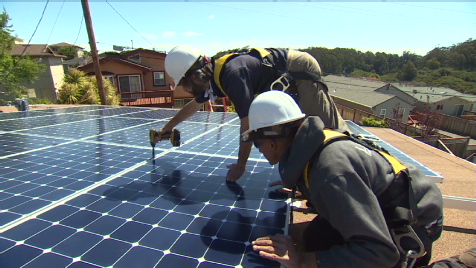Jeanine Cotter's two-hour commute from her San Francisco home to her job as in-house counsel at software maker Intuit gave her plenty of time to think -- mostly about how much she disliked commuting.
"It was nonproductive time," says Cotter, age 46, who began making the drive in 2000.
Those lost hours, combined with the demands of her work, made it difficult for her to meet her family's needs. "It was hard to find balance," recalls the mom of three.
Having seen entrepreneurs in action -- small business was the core of Intuit's customer base -- Cotter admired their flexibility, and she began itching to start her own company. Around 2004, conversations with her parents and husband, all of whom had experience in renewable energy, got her thinking about solar contracting.
"Just looking at the rising cost of energy and the concern over global warming, I saw an opportunity."
So, with the backing of her husband, Noel, who worked in construction, Cotter incorporated Luminalt, a company to design and install solar systems. Meanwhile, Noel got licensed in solar contracting and connected with a firm that began outsourcing jobs to Luminalt.
By 2006, Luminalt was making consistent revenue, and Jeanine gave up her $138,000 paycheck to run the growing business full-time.
Two years later San Francisco launched a solar incentive program. That, plus a federal tax credit, pushed Luminalt's sales from $678,000 in 2007 to $1.8 million in 2008. Cotter took her first salary -- $78,000 -- that year.
She's kept her pay (and that of her husband, who is chief technical officer) at the same level. With incentives shrinking, her focus now is on "building long-term value" -- by expanding the firm's geographic range, product offerings, and job scope.
"I never envisioned myself as someone willing to take huge risks," says Cotter. "But I've thrown myself into this and completely love it." (Watch: What health reform means for small business)
HOW SHE DID IT
Cost to start up: $225,000
Cotter raised that cash -- used for an office, a truck, insurance, licensing and living expenses, among other things -- in part by cashing out her 401(k). "It was losing money at the time," she says. "Meanwhile, we had a company that was growing."
Months Cotter worked double duty: 18
With one of her kids soon to start college, Cotter didn't feel ready to give up her Intuit salary until Luminalt was pulling revenue. She decided to make the leap once the company had annual sales of about $100,000.
Her family's stake in the business: 67%
Jeanine holds 51% of Luminalt, her husband has 16%, and the rest is owned by the company's VP of engineering, to whom they sold stock on an IOU. "He's really talented and I want him here for the long haul," says Cotter.
Plus, now he has the incentive to "grow the company so he can pay that debt off.
Source: http://money.cnn.com/2012/07/02/smallbusiness/solar-entrepreneurs.moneymag/index.htm
"It was nonproductive time," says Cotter, age 46, who began making the drive in 2000.
Those lost hours, combined with the demands of her work, made it difficult for her to meet her family's needs. "It was hard to find balance," recalls the mom of three.
Having seen entrepreneurs in action -- small business was the core of Intuit's customer base -- Cotter admired their flexibility, and she began itching to start her own company. Around 2004, conversations with her parents and husband, all of whom had experience in renewable energy, got her thinking about solar contracting.
"Just looking at the rising cost of energy and the concern over global warming, I saw an opportunity."
So, with the backing of her husband, Noel, who worked in construction, Cotter incorporated Luminalt, a company to design and install solar systems. Meanwhile, Noel got licensed in solar contracting and connected with a firm that began outsourcing jobs to Luminalt.
By 2006, Luminalt was making consistent revenue, and Jeanine gave up her $138,000 paycheck to run the growing business full-time.
Two years later San Francisco launched a solar incentive program. That, plus a federal tax credit, pushed Luminalt's sales from $678,000 in 2007 to $1.8 million in 2008. Cotter took her first salary -- $78,000 -- that year.
She's kept her pay (and that of her husband, who is chief technical officer) at the same level. With incentives shrinking, her focus now is on "building long-term value" -- by expanding the firm's geographic range, product offerings, and job scope.
"I never envisioned myself as someone willing to take huge risks," says Cotter. "But I've thrown myself into this and completely love it." (Watch: What health reform means for small business)
HOW SHE DID IT
Cost to start up: $225,000
Cotter raised that cash -- used for an office, a truck, insurance, licensing and living expenses, among other things -- in part by cashing out her 401(k). "It was losing money at the time," she says. "Meanwhile, we had a company that was growing."
Months Cotter worked double duty: 18
With one of her kids soon to start college, Cotter didn't feel ready to give up her Intuit salary until Luminalt was pulling revenue. She decided to make the leap once the company had annual sales of about $100,000.
Her family's stake in the business: 67%
Jeanine holds 51% of Luminalt, her husband has 16%, and the rest is owned by the company's VP of engineering, to whom they sold stock on an IOU. "He's really talented and I want him here for the long haul," says Cotter.
Plus, now he has the incentive to "grow the company so he can pay that debt off.
Source: http://money.cnn.com/2012/07/02/smallbusiness/solar-entrepreneurs.moneymag/index.htm

No comments:
Post a Comment